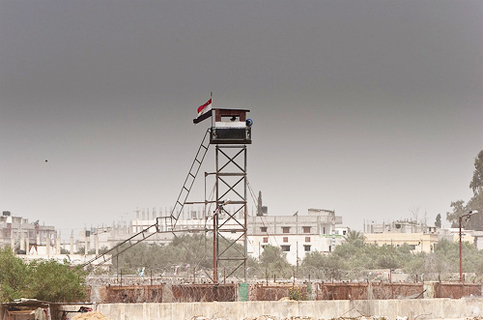- Huffington Post Robert Naiman, Policy Director of Just Foreign Policy

- Photo: Egyptian military watch tower on border with Gaza Strip, Palestine.
Cairo – Twelve hours before this writing, it appeared that 50,000 Palestinians in Gaza planning to march to the Erez border crossing with Israel on Thursday in protest of the continuing blockade on Gaza might not be accompanied by any of the 1400 internationals who had come to Egypt planning to join the Gaza Freedom March.
But on Tuesday Egypt agreed to let 100 of the 1400 marchers depart for Gaza Wednesday morning. This came as just the story of the Egyptian government crackdown on largely Western peace activists was starting to spill from the Arab media and European media into the US press.
Egypt’s partial concession means that 50,000 Palestinian marchers will have 100 companions representing some 40 countries to act as a deterrent against Israeli government violence – and to help get the story out about Gazans nonviolently protesting the blockade.
Egypt’s concession leaves 1300 of us here in Cairo to continue to press the case on the Egyptian government – together with many sympathetic Egyptians – that Egypt should cease supporting the U.S.-Israeli blockade on Gaza.
Of course, as a simple matter of geography – Gaza has two land borders, one with Israel, and one with Egypt – the blockade would be impossible without Egyptian cooperation. And indeed, that cooperation has been explicitly described in the press in recent days, with a spokesman for the Viva Palestina aid convoy telling AFP that in talks with Egypt, Egypt insisted that Viva Palestina “coordinate” with the Israeli government.
At the same time, the Egyptian government had blocked the international activists and foreigners generally not only from going to Gaza, but from getting anywhere near the Egypt-Gaza border. I myself was pulled off a bus today by Egyptian police just outside Ismailiya and sent back to Cairo – along with three Australian tourists who were only trying to reach Port Said. Ismailiya is some 150 miles west of Gaza, so that gives you some sense of how large the Egyptian “security perimeter” around Gaza has been.
The international pressure generated around the Gaza Freedom March and the Viva Palestina convoy has shown that internationally, the blockade on Gaza is very vulnerable politically. More pressure and attention can end it. It would certainly help if the New York Times and the Washington Post would stop ignoring the rising din of protest.


